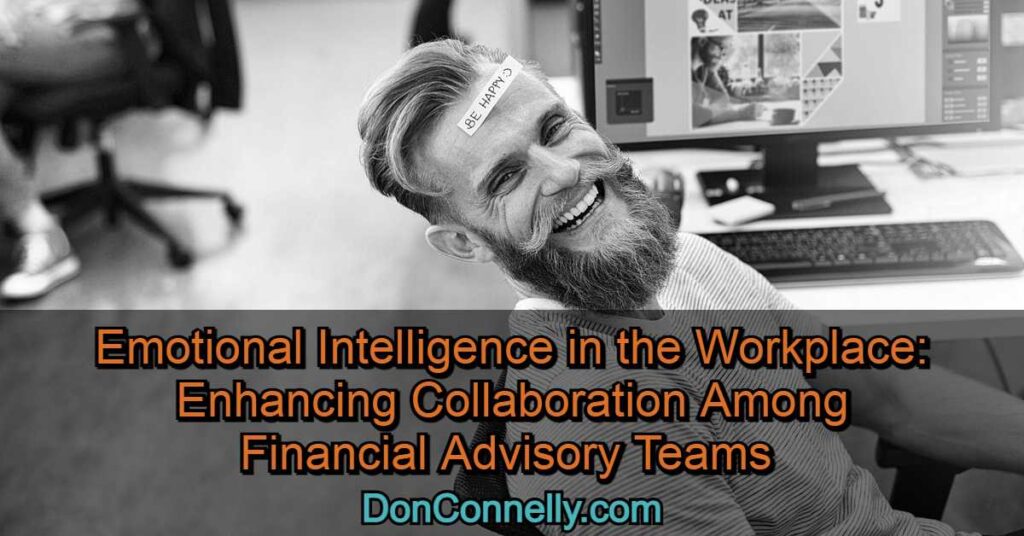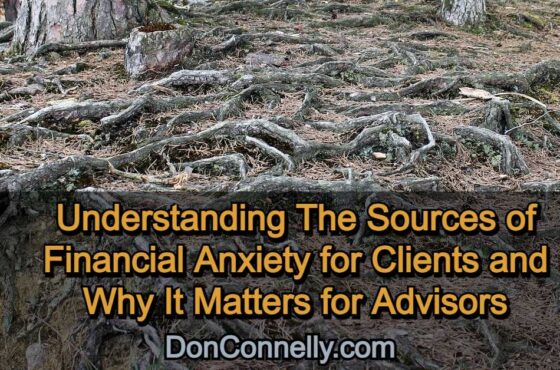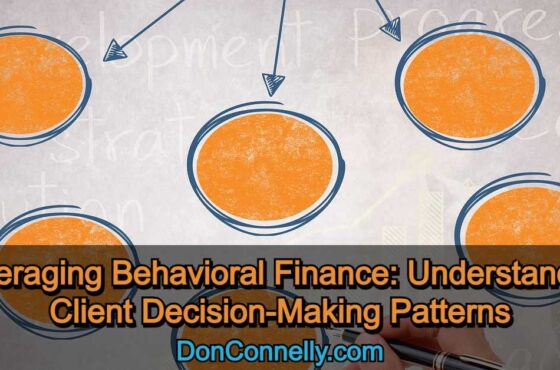Emotional Intelligence in the Workplace: Enhancing Collaboration Among Financial Advisory Teams
 As we’ve posted before, Emotional Intelligence (EI), the ability to understand and manage one’s emotions while being sensitive to the emotions of others, is a critical factor in a financial advisor’s success. Advisors with strong EI are more adept at navigating sensitive conversations, helping clients overcome anxieties, and recognizing underlying fears or hopes that are explicitly communicated.
As we’ve posted before, Emotional Intelligence (EI), the ability to understand and manage one’s emotions while being sensitive to the emotions of others, is a critical factor in a financial advisor’s success. Advisors with strong EI are more adept at navigating sensitive conversations, helping clients overcome anxieties, and recognizing underlying fears or hopes that are explicitly communicated.
With sharper emotional acuity, they are able to build stronger and more enduring trust-based relationships.
For those same reasons, emotional intelligence in the workplace is also a critical factor for success. Studies show that teams with high EI outperform those with low EI by up to 20%. While financial advisors focus on building emotional intelligence for client relationships, their role in fostering effective team collaboration is just as vital.
Strong EI within advisory teams leads to improved communication, trust, and resilience—key elements for navigating high-stakes decisions and complex financial strategies. This post explores how financial advisory teams can harness emotional intelligence to enhance collaboration, improve team dynamics, and drive business success.
Why Emotional Intelligence in the workplace matters
Emotional intelligence improves collaboration by enhancing trust, empathy, and mutual understanding among team members. In financial advisory teams, where professionals juggle high-pressure decisions and diverse work styles, EI acts as the glue that holds the team together. Without it, misunderstandings and conflicts can disrupt productivity and morale.
For instance, consider a firm where advisors frequently collaborate on high-net-worth client portfolios. In one case, a senior advisor’s abrupt communication style clashed with a junior advisor’s detail-oriented approach.
The firm transformed team dynamics by implementing EI training, emphasizing empathy and active listening, leading to smoother workflows, better client outcomes, and a more cohesive team environment. This example highlights how emotional intelligence is not just a soft skill but a strategic advantage in financial advising.
Assessing Emotional Intelligence in your team
Before you can improve team EI, assessing its current state is crucial. Understanding individual and collective EI levels helps identify strengths and areas needing development. Several tools can aid this process:
- Self-assessments – Encourage team members to evaluate their emotional awareness, self-regulation, and interpersonal skills.
- Feedback surveys – Collect anonymous feedback from team members to gauge emotional climate and communication effectiveness.
- External evaluations – Engage professional coaches or consultants to conduct EI assessments and provide actionable insights.
Creating a safe, non-judgmental environment for these evaluations is essential. When team members feel comfortable acknowledging areas for improvement, they are more likely to embrace growth and change.
Strategies to enhance team Emotional Intelligence
Building a more emotionally intelligent financial advisory team requires targeted strategies that address self-awareness, communication, conflict resolution, and team bonding.
#1. Building self-awareness and empathy
Self-awareness is the foundation of emotional intelligence. When advisors understand their emotions and impact on others, they can regulate responses and build stronger relationships.
Encourage reflection. Have team members journal their emotional triggers and responses in professional settings.
Empathy exercises. Conduct group discussions where members share client scenarios and explore different emotional perspectives to foster understanding.
#2. Improving communication
Effective communication is essential for collaboration. Financial advisory teams can enhance their interactions by focusing on both verbal and non-verbal cues.
Active listening practices. Train advisors to listen with full attention, paraphrase key points, and ask clarifying questions to ensure mutual understanding.
Structured feedback sessions. Implement regular feedback loops where team members can share constructive insights in a supportive setting.
Reading emotional cues. Teach advisors to recognize body language and tone of voice to better interpret colleagues’ and clients’ emotions.
#3. Resolving conflict through EI
Disagreements are inevitable, but emotionally intelligent teams handle them constructively.
Reframing negative emotions. Encourage advisors to view conflicts as opportunities for growth rather than personal attacks.
Using “I” statements. Promote communication techniques like “I feel concerned when deadlines are missed” instead of “You never meet deadlines” to reduce defensiveness and encourage resolution.
Emotional regulation techniques. Train teams in stress management strategies, such as deep breathing or pausing before reacting, to keep discussions productive.
#4. Team-building activities
Fostering emotional bonds strengthens team cohesion and collaboration.
Role-playing scenarios. Simulate challenging client interactions where team members practice emotionally intelligent responses.
Group problem-solving challenges. Engage teams in activities that require collaboration, encouraging them to navigate emotions and decision-making together.
Leadership’s role in promoting EI in the workplace
Leaders set the tone for emotional intelligence in a team. They create a culture where EI thrives by modeling behaviors like active listening, empathy, and self-regulation. Effective leadership strategies include:
Setting clear expectations. Defining team norms for respectful communication and collaboration.
Recognizing contributions. Acknowledging individual and team achievements to foster morale and motivation.
Providing ongoing support. Offering training, mentorship, and resources to continuously develop team EI.
Bottom Line
Developing emotional intelligence can be a game-changer for financial advisory teams. Advisors can enhance collaboration and overall business success by fostering self-awareness, improving communication, resolving conflicts constructively, and engaging in team-building activities. Start by assessing your team’s EI today and implement one actionable strategy to begin strengthening your team dynamics.
Watch this 3-minute video to learn how our customized coaching program can help your team master specific soft skills to start growing your Assets Under Management immediately.
See program details and enroll today!
The personal approach we employ when designing this customized coaching ensures that the training will match the specific needs you or your company might have. Select your format and enroll now!



